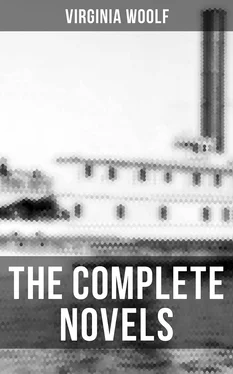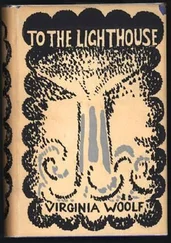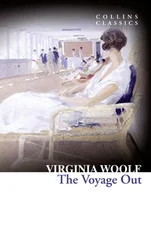“What would Mary Datchet and Ralph Denham say?” she reflected, pausing by the window, which, as the night was warm, she raised, in order to feel the air upon her face, and to lose herself in the nothingness of night. But with the air the distant humming sound of far-off crowded thoroughfares was admitted to the room. The incessant and tumultuous hum of the distant traffic seemed, as she stood there, to represent the thick texture of her life, for her life was so hemmed in with the progress of other lives that the sound of its own advance was inaudible. People like Ralph and Mary, she thought, had it all their own way, and an empty space before them, and, as she envied them, she cast her mind out to imagine an empty land where all this petty intercourse of men and women, this life made up of the dense crossings and entanglements of men and women, had no existence whatever. Even now, alone, at night, looking out into the shapeless mass of London, she was forced to remember that there was one point and here another with which she had some connection. William Rodney, at this very moment, was seated in a minute speck of light somewhere to the east of her, and his mind was occupied, not with his book, but with her. She wished that no one in the whole world would think of her. However, there was no way of escaping from one’s fellow-beings, she concluded, and shut the window with a sigh, and returned once more to her letters.
She could not doubt but that William’s letter was the most genuine she had yet received from him. He had come to the conclusion that he could not live without her, he wrote. He believed that he knew her, and could give her happiness, and that their marriage would be unlike other marriages. Nor was the sonnet, in spite of its accomplishment, lacking in passion, and Katharine, as she read the pages through again, could see in what direction her feelings ought to flow, supposing they revealed themselves. She would come to feel a humorous sort of tenderness for him, a zealous care for his susceptibilities, and, after all, she considered, thinking of her father and mother, what is love?
Naturally, with her face, position, and background, she had experience of young men who wished to marry her, and made protestations of love, but, perhaps because she did not return the feeling, it remained something of a pageant to her. Not having experience of it herself, her mind had unconsciously occupied itself for some years in dressing up an image of love, and the marriage that was the outcome of love, and the man who inspired love, which naturally dwarfed any examples that came her way. Easily, and without correction by reason, her imagination made pictures, superb backgrounds casting a rich though phantom light upon the facts in the foreground. Splendid as the waters that drop with resounding thunder from high ledges of rock, and plunge downwards into the blue depths of night, was the presence of love she dreamt, drawing into it every drop of the force of life, and dashing them all asunder in the superb catastrophe in which everything was surrendered, and nothing might be reclaimed. The man, too, was some magnanimous hero, riding a great horse by the shore of the sea. They rode through forests together, they galloped by the rim of the sea. But waking, she was able to contemplate a perfectly loveless marriage, as the thing one did actually in real life, for possibly the people who dream thus are those who do the most prosaic things.
At this moment she was much inclined to sit on into the night, spinning her light fabric of thoughts until she tired of their futility, and went to her mathematics; but, as she knew very well, it was necessary that she should see her father before he went to bed. The case of Cyril Alardyce must be discussed, her mother’s illusions and the rights of the family attended to. Being vague herself as to what all this amounted to, she had to take counsel with her father. She took her letters in her hand and went downstairs. It was past eleven, and the clocks had come into their reign, the grandfather’s clock in the hall ticking in competition with the small clock on the landing. Mr. Hilbery’s study ran out behind the rest of the house, on the ground floor, and was a very silent, subterranean place, the sun in daytime casting a mere abstract of light through a skylight upon his books and the large table, with its spread of white papers, now illumined by a green reading-lamp. Here Mr. Hilbery sat editing his review, or placing together documents by means of which it could be proved that Shelley had written “of” instead of “and,” or that the inn in which Byron had slept was called the “Nag’s Head” and not the “Turkish Knight,” or that the Christian name of Keats’s uncle had been John rather than Richard, for he knew more minute details about these poets than any man in England, probably, and was preparing an edition of Shelley which scrupulously observed the poet’s system of punctuation. He saw the humor of these researches, but that did not prevent him from carrying them out with the utmost scrupulosity.
He was lying back comfortably in a deep arm-chair smoking a cigar, and ruminating the fruitful question as to whether Coleridge had wished to marry Dorothy Wordsworth, and what, if he had done so, would have been the consequences to him in particular, and to literature in general. When Katharine came in he reflected that he knew what she had come for, and he made a pencil note before he spoke to her. Having done this, he saw that she was reading, and he watched her for a moment without saying anything. She was reading “Isabella and the Pot of Basil,” and her mind was full of the Italian hills and the blue daylight, and the hedges set with little rosettes of red and white roses. Feeling that her father waited for her, she sighed and said, shutting her book:
“I’ve had a letter from Aunt Celia about Cyril, father…. It seems to be true—about his marriage. What are we to do?”
“Cyril seems to have been behaving in a very foolish manner,” said Mr. Hilbery, in his pleasant and deliberate tones.
Katharine found some difficulty in carrying on the conversation, while her father balanced his finger-tips so judiciously, and seemed to reserve so many of his thoughts for himself.
“He’s about done for himself, I should say,” he continued. Without saying anything, he took Katharine’s letters out of her hand, adjusted his eyeglasses, and read them through.
At length he said “Humph!” and gave the letters back to her.
“Mother knows nothing about it,” Katharine remarked. “Will you tell her?”
“I shall tell your mother. But I shall tell her that there is nothing whatever for us to do.”
“But the marriage?” Katharine asked, with some diffidence.
Mr. Hilbery said nothing, and stared into the fire.
“What in the name of conscience did he do it for?” he speculated at last, rather to himself than to her.
Katharine had begun to read her aunt’s letter over again, and she now quoted a sentence. “Ibsen and Butler…. He has sent me a letter full of quotations—nonsense, though clever nonsense.”
“Well, if the younger generation want to carry on its life on those lines, it’s none of our affair,” he remarked.
“But isn’t it our affair, perhaps, to make them get married?” Katharine asked rather wearily.
“Why the dickens should they apply to me?” her father demanded with sudden irritation.
“Only as the head of the family—”
“But I’m not the head of the family. Alfred’s the head of the family. Let them apply to Alfred,” said Mr. Hilbery, relapsing again into his arm-chair. Katharine was aware that she had touched a sensitive spot, however, in mentioning the family.
“I think, perhaps, the best thing would be for me to go and see them,” she observed.
Читать дальше












